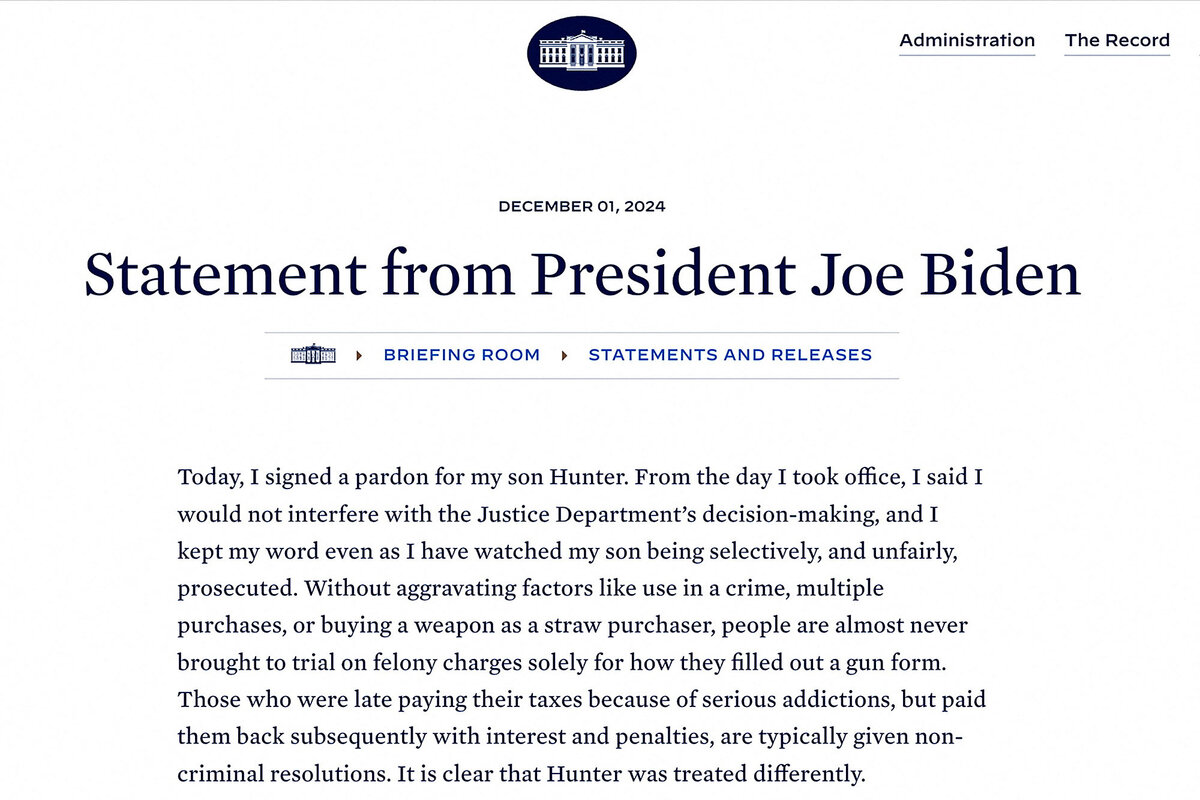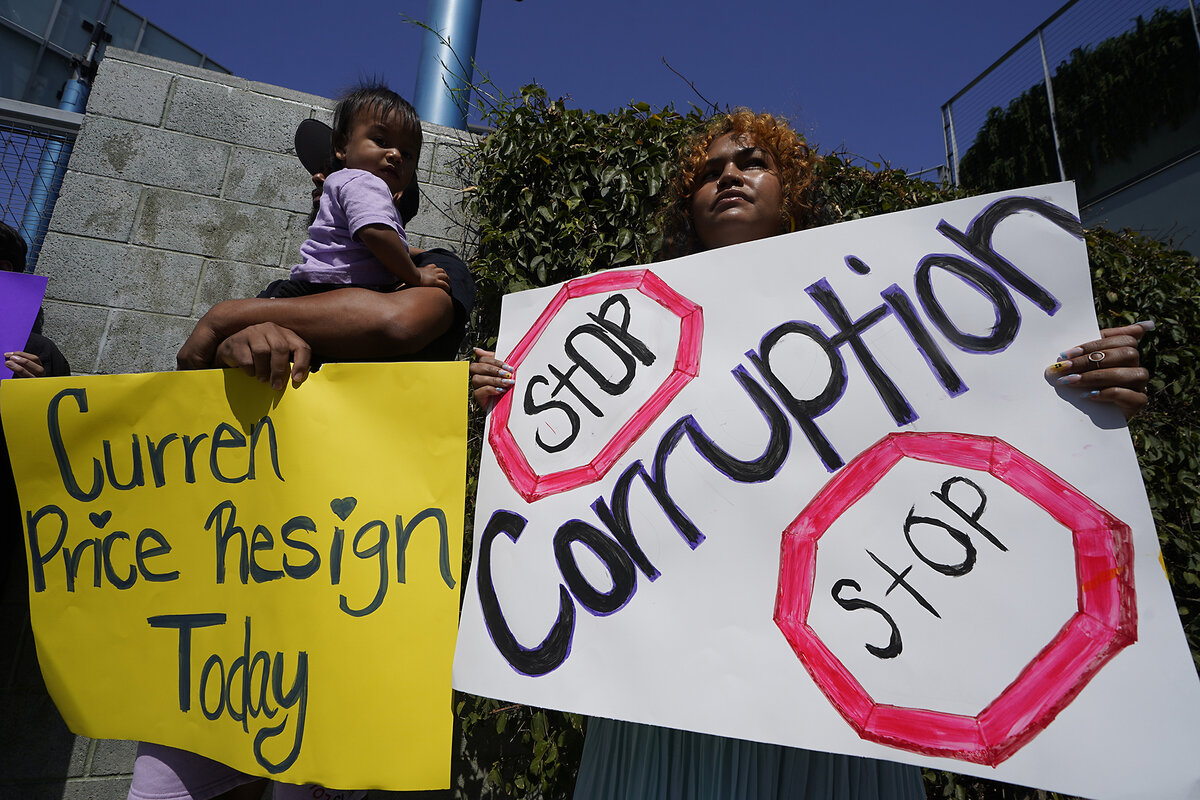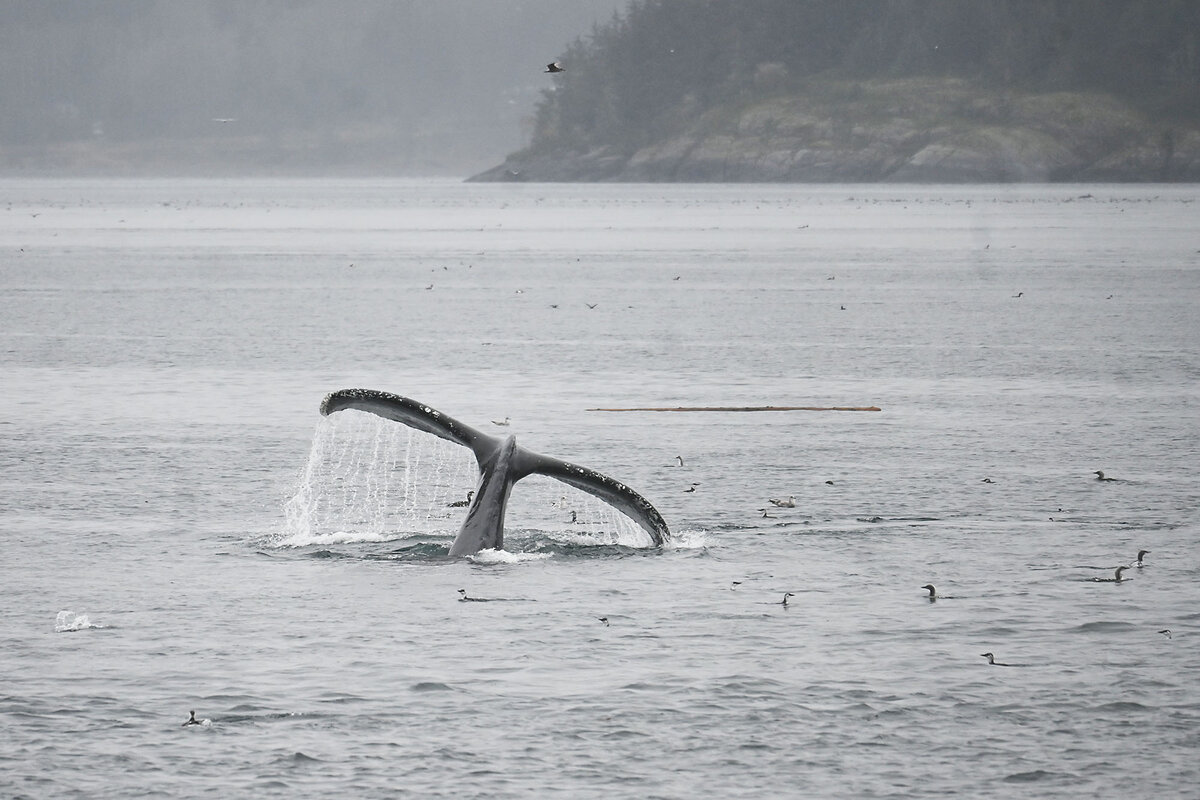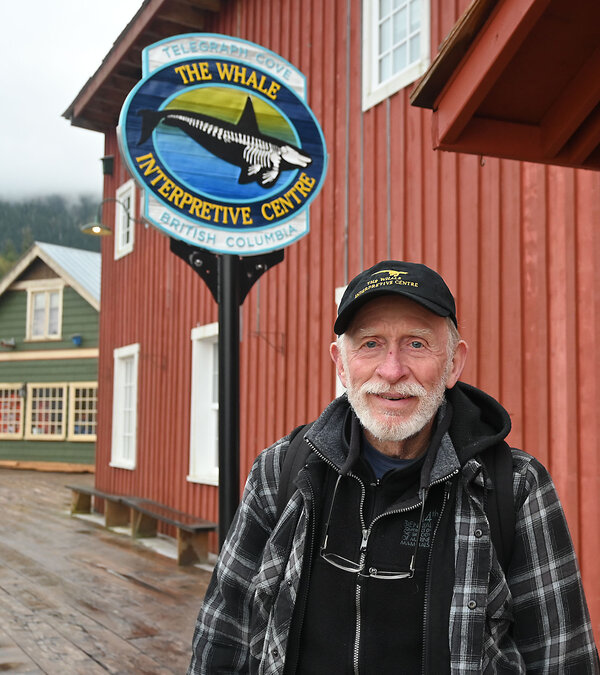- Quick Read
- Deep Read ( 6 Min. )

Why is Christian Science in our name?
Our name is about honesty. The Monitor is owned by The Christian Science Church, and we’ve always been transparent about that.
The Church publishes the Monitor because it sees good journalism as vital to progress in the world. Since 1908, we’ve aimed “to injure no man, but to bless all mankind,” as our founder, Mary Baker Eddy, put it.
Here, you’ll find award-winning journalism not driven by commercial influences – a news organization that takes seriously its mission to uplift the world by seeking solutions and finding reasons for credible hope.
Explore values journalism About usIn Today’s Issue
- A controversial pardon fuels concerns about politicized justice
- Today’s news briefs
- High-profile scandals lead to high-profile local reforms in California
- For supporters of Gisèle Pelicot, her rape trial courthouse has become must-visit
- After a Canadian orca pod’s decline, now ‘you can see the whales coming back’
- New turtle moms and school buses making electricity
Monitor Daily Podcast
- Follow us:
- Apple Podcasts
- Spotify
- RSS Feed
- Download
TODAY’S INTRO
‘A renovating virtue’
William Wordsworth wrote that “There are in our existence spots of time, / That with distinct pre-eminence retain / A renovating virtue.” His poem came to mind as I read Colette Davidson’s story today on women flocking to support Gisèle Pelicot, whose husband’s ongoing trial for years of drugging and raping her, and inviting others to do the same, has gripped France.
Colette unfolds the power of one person’s example, as women, moved by Ms. Pelicot’s daily presence in court, have flocked to her side. They’re taking time off from work and traveling to support her and thank her face-to-face. It’s a portrait of that “renovating virtue,” which, Wordsworth continues, “enables us to mount, / When high, more high, and lifts us up when fallen.”
Share this article
Link copied.

Help fund Monitor journalism for $11/ month
Already a subscriber? Login

Monitor journalism changes lives because we open that too-small box that most people think they live in. We believe news can and should expand a sense of identity and possibility beyond narrow conventional expectations.
Our work isn't possible without your support.
A controversial pardon fuels concerns about politicized justice
A blanket pardon for the U.S. president’s son adds a new strain on public confidence in the justice system, amid wider signs that federal justice isn’t immune from the political divisiveness that has gripped America’s public square.

At the end of Thanksgiving weekend with his family, President Joe Biden wielded his executive power both as America’s leader and as a father.
That action – issuing a broad pardon for his son Hunter – could both tarnish the outgoing president’s legacy and have troubling consequences for a justice system many Americans now view as politicized and ineffective.
There are few limits on the presidential pardon power. But Mr. Biden’s announcement on Sunday has provoked bipartisan criticism. The pardon is unusual in that it is both for an immediate family member and exceptionally broad in scope. It also comes after the president said on multiple occasions that, out of respect for the proceedings that found his son guilty of multiple federal crimes, he would leave the convictions in place.
And the pardon comes as politics and the legal system have become increasingly intertwined. Next month, Mr. Biden will cede his office to Donald Trump, who has been subject to multiple federal prosecutions himself and has said he will use the federal justice system to pursue his political enemies.
“Both sides are using the justice system to justify political actions, and that is worrying about our time,” says Jeffrey Cohen, a Boston College Law School professor and former federal prosecutor. “A race to the bottom,” he says, is “not good for any of us.”
A controversial pardon fuels concerns about politicized justice

At the end of Thanksgiving weekend with his family, President Joe Biden wielded his executive power both as America’s leader and as a father.
That action – issuing a broad pardon for his son Hunter – could both tarnish the outgoing president’s legacy and have troubling consequences for a justice system many Americans now view as politicized and ineffective.
There are few limits on presidential pardon power. But President Biden’s announcement on Sunday has provoked bipartisan criticism. The pardon is unusual in that it is both for an immediate family member and exceptionally broad in scope. It also comes after the president said on multiple occasions that, out of respect for the proceedings that found his son guilty of multiple federal crimes, he would leave the convictions in place.
And the pardon comes as politics and the criminal legal system have become increasingly intertwined. Next month, Mr. Biden will cede his office to Donald Trump, who has been subject to multiple federal prosecutions himself and has said he will use the federal justice system to pursue his political enemies.
All told, the episode represents another blow to public confidence in the justice system – particularly its independence from politics. Mr. Biden’s pardoning of his last surviving son may represent a measure of justice and compassion for some, but for others, it represents more evidence that the system is corrupt and broken.
“Both sides are using the justice system to justify political actions, and that is worrying about our time,” says Jeffrey Cohen, a Boston College Law School professor and former federal prosecutor.
“Everybody can point to things that they view as unjust and a weaponization of the system,” he adds. “I hope we all see that it’s just a race to the bottom, that it’s not good for any of us.”
A guilty plea, fines, and the prospect of decades in prison
Over the summer, a federal jury in Delaware found Hunter Biden guilty on three felony gun charges. Months later, he pleaded guilty to nine tax-related charges, including three felonies. All told, he faced a prospect of decades in prison and over $1 million in fines.
The convictions came after yearslong investigations by the U.S. Department of Justice and Republicans in Congress into alleged crimes committed by members of the Biden family. But in a statement released Sunday, President Biden said both prosecutions were excessive and politically motivated, justifying a pardon.

“No reasonable person who looks at the facts of Hunter’s cases can reach any other conclusion than Hunter was singled out only because he is my son,” he wrote.
Still, the statement made clear that President Biden was motivated not just by a perceived injustice, but also by his feelings as a father. Writing that “raw politics” had “infected” the prosecutions, he asked Americans to “understand why a father and a President would come to this decision.”
Many presidents have issued pardons for relatives and political allies. But empathy for Mr. Biden’s decision has been more the exception than the rule, even across party lines.
Mr. Trump, in a social media post on Monday, called the pardon “a miscarriage of justice.” Rep. James Comer, the Republican congressman who has led investigations into members of the Biden family for years, said in a statement, “It’s unfortunate that, rather than come clean about their decades of wrongdoing, President Biden and his family continue to do everything they can to avoid accountability.”
Some Democrats criticized Mr. Biden’s decision. The pardon “put personal interest ahead of duty and further erodes Americans’ faith that the justice system is fair and equal for all,” wrote Michael Bennet, a Colorado senator, on social media. Colorado Gov. Jared Polis echoed that sentiment in a social media post.
“As a father I certainly understand [his] natural desire to help his son by pardoning him,” he wrote. But, “This is a bad precedent that could be abused by later presidents.”
Family matters and broad pardons
Not only has no president pardoned an immediate family member before, but Mr. Biden also issued an unusually sweeping pardon. He granted his son a “full and unconditional” pardon for all offenses he committed or may have committed, since Jan. 1, 2014 – a period including his final two years as vice president and his entire term as president.
During his first term, Mr. Trump pardoned Charles Kushner, the father of his son-in-law Jared Kushner. He had served more than 16 months of a two-year sentence in federal prison and a halfway program for various financial crimes before he was released in 2006.
“The only real precedent for such a broad grant is [Gerald] Ford’s pardon of Richard Nixon” after the Watergate scandal, says Mark Osler, a professor at the University of St. Thomas School of Law.
“Typically, a pardon grant is going to say, ‘For this conviction,’ or ‘For this set of acts,’” he adds. “Here we have none of that.”
A regular citizen in Hunter Biden’s position would likely not have received a pardon, experts say. But the pardon, and its broad scope, is undoubtedly a product of Mr. Trump’s reelection last month.
The former and future president has spent the last four years fighting four criminal investigations, including two brought by President Biden’s Justice Department into Mr. Trump’s alleged retention of classified documents and his alleged efforts to stay in power after his 2020 election defeat.
Those two cases are now winding down as Mr. Trump prepares to install new Justice Department leadership. Mr. Trump has maintained his innocence in all the cases against him and has said that if he regained the presidency, he would exact retribution on his political opponents.
In this context, Mr. Biden pardoning his son is both understandable and further damaging to a polarized and distrustful nation, says Cara Foos Pierce, an assistant professor at Southern Methodist University Dedman School of Law, in an email.
“While I understand his strong desire to protect his son from prison,” she adds, “President Biden is sending the message that the law does not apply the same to powerful, politically connected people as it does to everyone else.”
“The idea that you can break the law with no consequences if you are close with the President is damaging to democracy,” she continues.
A weakening firewall between justice and politics
Repairing that damage will be difficult, experts say, but it could begin with Mr. Trump’s next administration, if not sooner. The president-elect, however, has not signaled an interest in extricating the justice system from political fights.
Reinstating an executive order from the final weeks of his first presidency could give him the power to fire rank-and-file Justice Department employees who do not do his bidding. He has threatened to prosecute Jack Smith, the special counsel who brought the federal cases against him, as well as members of the Biden family. So has Pam Bondi, his nominee for attorney general. And Mr. Trump has said that he will issue pardons for at least some defendants convicted for participating in the Jan. 6 insurrection that sought to overturn his election defeat.
Ultimately, Mr. Trump’s drive to surround himself with loyalists complicates efforts to restore perceptions that the justice system will act independently of politics.
Mr. Trump “should fight the urge to put his outspoken supporters in leadership positions in federal law enforcement agencies,” says Professor Pierce. “If he does, he will be showing the country that he cares more about the rule of law than his personal feelings about how the justice system has mistreated him.”
There’s at least one way Mr. Biden could begin the work of repairing trust in federal justice, says Professor Osler: by using the presidential pardon power in a more conventional, impartial way. To date, he has issued fewer pardons and commutations than any other president this century, including Mr. Trump.
The pardon of his son is “going to be a stain on his legacy,” says Professor Osler, a former federal prosecutor and an expert in sentencing and clemency. “The best thing he could do is to show this remarkable tool isn’t just for his family.”

News Briefs
Today’s news briefs
• South Korean parliament votes to lift martial law: Just three hours after President Yoon Suk Yeol declared martial law, the parliament voted to reverse the order, which the president said was to eliminate “anti-state” actions.
• Ukraine pushes to join NATO: Ukraine blasted an agreement struck 30 years ago under which it relinquished nuclear weapons in exchange for security assurances that never materialized. It is calling for robust security guarantees to protect it from renewed Russian aggression.
• Union win in Wisconsin: Public workers and teachers unions are celebrating a ruling that restores collective bargaining rights they lost under a 2011 state law.
• China export ban: China has announced a ban on exports of gallium, germanium, and other key high-tech materials with potential military applications to the United States.

High-profile scandals lead to high-profile local reforms in California
Fed up with high-profile scandals, California voters chose greater transparency and accountability in local elections.

- Quick Read
- Deep Read ( 4 Min. )
When Ben Flores went to the polls in Los Angeles last month, it wasn’t the presidential election that had him fired up. He was drawn by a city charter amendment that would create an independent commission for determining new city council districts.
The 27-year-old freelance copy editor is among millions of Californians who responded to years of high-profile ethics scandals here by ushering in policies promising greater transparency and accountability – and turning out some officials tainted with suspicion.
A crescendo of mistrust at the local level made the moment ripe for ethics reforms throughout the Golden State, and especially in LA, where a slate of measures will overhaul local government. And across the United States, the mood was apparent: Lawmakers in 34 states introduced 146 ethics bills to state legislatures.
“In general, there’s a feeling that politics is a game for moneyed interest and politics is about pay to play,” says Jessica Levinson, director of Loyola Law School’s Public Service Institute. Add to that these examples of “politicians behaving badly, and you have a perfect ingredient for voters to be in a reform state of mind.”
High-profile scandals lead to high-profile local reforms in California

When Ben Flores went to the polls in Los Angeles last month, it wasn’t the presidential election that had him fired up. He was drawn by a city charter amendment that would create an independent commission for determining new city council districts.
“It just doesn’t make sense that the people who are making policy are also the ones who are, like, establishing their own districts,” says the 27-year-old copy editor. “I think independent redistricting like that makes a lot of sense.”
Mr. Flores is among millions of Californians who responded to years of ethics scandals in the state by ushering in policies promising greater transparency and accountability – and turning out some officials tainted with suspicion.
Polls show Americans overwhelmingly believe large donors have too much influence on government – although a majority voted for a president with well-documented ethics breaches. But a crescendo of mistrust at the local level made the moment ripe for ethics reforms throughout the Golden State, and especially in Los Angeles, where a slate of measures will overhaul local government.
“In general, there’s a feeling that politics is a game for moneyed interest and politics is about pay to play,” says Jessica Levinson, director of Loyola Law School’s Public Service Institute. Add to that these examples of “politicians behaving badly, and you have a perfect ingredient for voters to be in a reform state of mind.”
Grabbing “ahold of the wheel”
California has had a run of recent high-profile scandals. In the Bay Area, voters recalled two top officials caught up in ethics probes: Oakland Mayor Sheng Thao and Alameda County District Attorney Pamela Price. Both were swept up in an FBI investigation of influence-peddling. The cloud of scandal added to deep frustrations with their progressive policies on crime.
In October, Orange County supervisor Andrew Do pleaded guilty to a bribery charge in connection with funneling millions of county dollars to a nonprofit run by his 20-something daughter.
At the beginning of the year, former LA City Councilmember José Huizar pleaded guilty to racketeering and tax evasion in what the FBI called “the most audacious public corruption case” in LA’s history.
In June the city Ethics Commission accused Councilmember John Lee of misusing his position, and the district attorney charged Councilmember Curren Price with embezzlement, perjury, and conflict of interest.
All of this is while the 2022 recorded conversations of LA councilmembers making racist remarks and discussing breaking up districts that represent largely Black communities are still fresh on voters’ minds. Two of the three recorded councilmembers lost reelection bids, and the other resigned.

In addition to a new independent commission for redistricting – a direct response to the recordings – LA voters last month also backed a requirement that city contractors disclose conflicts of interest, and approved autonomy and funding for the city’s existing Ethics Commission.
San Diego passed a similar measure to strengthen its Ethics Commission, and San Francisco voters approved a new inspector general in the county controller’s office to investigate fraud, waste, and abuse, and to issue subpoenas.
The most dramatic change will happen in LA County, where voters said yes to a new elected position to oversee the most populous county in the United States: county mayor. The same measure also takes the number of county supervisors from five to nine.
“If this works, what it basically proved is that the people can revamp their form of government,” says Raphael Sonenshein, executive director of the Haynes Foundation, which supports governance and democracy in Greater Los Angeles.
At the federal level, those changes are near impossible, he says. “But when you look at our local governments all across the country, that’s where every once in a while, often because of a crisis, people just grab ahold of the wheel as voters and basically say, ‘We’re going to make a change.’”
But those changes come with trade-offs, says Professor Levinson, a past president of LA’s Ethics Commission. The new county mayor, for instance, will be accountable to voters – but will be beholden to the campaign cycles of fundraising.
“That person is going to have to raise a lot of money. And where does that come from?” she asks. “It typically comes from people who have something to gain or lose from county government.” Voters, she adds, will be choosing the best campaigner.
Historic changes
This year alone, lawmakers in 34 states introduced 146 ethics bills to state legislatures. Twenty-nine of those, in 17 states, have been enacted.
The passage of Measure G, and the overhaul of LA County government, is historic, says Dr. Sonenshein. The elected mayor will replace an appointed county executive. And the county board of supervisors will nearly double – the first increase since it was established in 1852, when the county had 3,500 residents. Today it is close to 10 million.
Implementation is years away, along with a fuller realization of how these changes will impact policymakers and the communities they serve.
“This might allow a greater sense of what works and what doesn’t,” says Dr. Sonenshein, adding that the county mayor will offer residents a clear point person for their needs and frustrations. “And then when something does blow up, knowing where to go with how you feel about that is a big step forward. ... That’s how change happens.”

For supporters of Gisèle Pelicot, her rape trial courthouse has become must-visit
The Pelicot rape trial is not just drawing the attention of French media. The courthouse has become a gathering place for people, especially young women, seeking to support Gisèle Pelicot and the change they see her standing for.

- Quick Read
- Deep Read ( 5 Min. )
Since it began in September, the rape trial of Dominique Pelicot has captivated and outraged the French. But here in Avignon, where the case is being prosecuted, the trial has touched a nerve with local women.
Every day for the past three months, supporters have woken up early, taken time off work, and dedicated their off days to come here to the Avignon courtroom. They sit in silence, listening to often gruesome testimony.
That is by the request of Gisèle, Mr. Pelicot’s wife, whom he is accused of drugging with sleeping pills and raping for a decade. He is also charged with recruiting dozens of other men to rape her while he watched and recorded them. She wants her case to serve a larger purpose: to shift the shame surrounding rape onto the accused.
“I came here to support Gisèle, to show her that she’s not alone,” says Alison Pradel, a law student from Nimes. “Rape can’t be hidden in the shadows anymore.”
“It’s definitely something different to be here in person,” says Mathilde Portail, who took an hourlong train from Montpellier after work one day to see the trial for herself. “The number of people who have come to be here with Gisèle, and the signs around town – you can really feel the support.”
For supporters of Gisèle Pelicot, her rape trial courthouse has become must-visit
It’s 9 a.m. and court is in session. Inside the overflow room – a makeshift space set up for the public – a video feed blares proceedings from the main courtroom. A petite woman in all white calls this small, 60-odd crowd to order. There’s no talking allowed, no cellphones, and no food or drinks. During the break, those inside must leave so that those in the long line outside the door can get a chance to watch the trial.
“If you get up to use the bathroom,” she says, “you lose your spot.”
Across the hallway in the main courtroom is Dominique Pelicot, sitting slack-jawed and downtrodden. But this crowd of mostly women is not here to see him. They’re here to support Gisèle, his wife, whom Mr. Pelicot is accused of drugging with sleeping pills and raping for a decade. He also recruited dozens of men to rape her while he watched and recorded them.
Since it began in September, the Pelicot trial has captivated and outraged the French. But here in Avignon – and nearby Mazan where the rapes took place – the trial has touched a particular nerve with local women, with something resembling fandom for Ms. Pelicot.
Every day for the past three months, supporters have woken up early, taken time off work, and dedicated their off days to come here to the Avignon courtroom. Some come every week. For others it’s their first time. Most live within an hour of Avignon, but all have given up their day to be here.

They sit in silence, listening to often gruesome testimony from the lawyers of Mr. Pelicot and the 51 accused, and watching Mr. Pelicot’s rape videos that the trial has made public. That is by the request of Ms. Pelicot, who wants her case to serve a larger purpose: to shift the shame surrounding rape onto the accused.
“I came here to support Gisèle, to show her that she’s not alone,” says Alison Pradel, a university law student from Nimes, around 45 minutes away, who has come twice to court by herself. “To see her in person made it more concrete, more real. By making her case public, everyone can see what happened. Rape can’t be hidden in the shadows anymore.”
Mathilde Portail says she took an hourlong train after work one day in late November to see the trial for herself, after being “filled with anger” while reading about the trial from her home in Montpellier.
“It’s definitely something different to be here in person,” says Ms. Portail, during an hourlong wait in the security line to get into the courthouse. “The number of people who have come to be here with Gisèle, and the signs around town – you can really feel the support.”
Controversy in the community
A few steps from the courthouse is Avignon’s famous walled old city. Inside those walls, local feminist organizations have plastered signs of support for Ms. Pelicot, like “Rape is rape” and “Gisèle: Women thank you.”
But there is a palpable tension when court gets out of session. At Bar La Brasserie, a local restaurant, the owner says he recently decided to stop serving trial defendants who were regularly coming in during the lunch break because he “didn’t feel right about it.”
Across the street, three lawyers for the accused men – including two women – scrape off the “2” in “20 years for each.” Similar protest signs have been plastered around town, calling for 20 years of prison for each of the 51 accused, instead of the four to 18 that prosecutors are calling for.
Some of these men will never interact with the public. At least a dozen with previous convictions are held in court during breaks and at the end of each day are packed onto a prison bus. But the rest are free to walk around, have lunch in local restaurants, and chat in the courtroom lobby.
On a late November day, two of the accused wear pandemic-era masks, sunglasses, baseball caps, and hoodies as they enter court. But most don’t try to hide their faces and a majority are what the French press have dubbed, “Monsieur Tout le monde,” or “Mr. Everyman.” Indeed, among the list of the accused is a firefighter, a soldier, a journalist, and multiple farm workers; they’re of varying ages, ethnicities, and social backgrounds.

Most lived within a 35-mile radius of the Pelicots, in the small town of Mazan. That has put only a few degrees of separation between locals and the accused. Until now, Mazan was a quaint village of 6,000, known for its wine, fruit, and truffles. Now, it is being referred to as “the village of rapists.”
“Honestly, it defies comprehension. It’s like something out of science fiction,” says one bespectacled man at local Mazan restaurant called Le Siècle, who asked to remain anonymous. Like many residents here, he is tired of talking about the trial. “All I can think about is my two daughters. What if something like that happened to them?”
Gisèle Pelicot, feminist hero
When court gets back into session in Avignon, some of the women who attended the morning hearing are back in the line, hoping to get in to see this landmark trial. Others are here for the first time, like Margaux Oren, who took the train from Marseille with a friend to support Ms. Pelicot.
“It’s a historic moment,” says Ms. Oren, who has participated in feminist protests related to the trial. “I hope it’s going to bring rape culture to light. But it would be nice to see more men out here in support.”
Dominique Pelicot’s lawyer, Béatrice Zavarro, says that even if she feels like “the devil’s advocate,” gender didn’t play a role for her in deciding whether or not to take this case. In fact, during a break from court, she says she’s received an outpouring of female support “for bringing justice to victims of sexual violence while defending Dominique.”
Last month, French Equality Minister Salima Saa unveiled several measures to combat sexual violence against women. On French radio in mid-November, she said there will be “a before Mazan and an after Mazan, just like there was a before and after #MeToo.” The verdict is expected on Dec. 20.
The Pelicot trial appears to be a watershed moment for France. And for French women, Ms. Pelicot is their feminist hero.
“One day, Gisèle walked by me after court. I went up to her and just said, ‘Thank you,’ and, ‘We’re all here for you,’” says Avignon local Maguelonne Courbet, who has attended the Pelicot trial court proceedings four times. “She looked at me with tears in her eyes. It shook me to the core. I still get chills thinking about it.”

After a Canadian orca pod’s decline, now ‘you can see the whales coming back’
A Canadian marine reserve created 40 years ago is credited with a rare win for the ecosystem: reversing the decline of one population of Northern resident orca whales and deepening local human allegiance to the mammals.

- Quick Read
- Deep Read ( 5 Min. )
For decades, Jim Borrowman has been watching over orcas in British Columbia. He was among those who successfully lobbied in the early 1980s to set aside a protected area for Northern resident orcas, which lost a third of their population to hunting and capture in the 1950s and ’60s.
This act of ocean preservation laid a foundation from which decades of important research – and a deep local allegiance to the whales – have flourished. Galvanized by this data, environmentalists and First Nations just won a battle to evict commercial, open-net fish farms from the area, which compete with the orcas’ food supply.
There are early signs of abundant salmon, and a small but decades-long uptick in the Northern resident population numbers.
“You can see the whales coming back,” says Alexandra Morton, an author and marine biologist who has studied salmon in the Johnstone Strait since the 1980s.
It’s too early for data to directly link farm closures and the jump in salmon numbers. But, Ms. Morton says, it’s a rare win for the ecosystem.
“There’s many people who have fought 30, 40 years like I have to protect something, and they don’t see it rebound,” she says. “And yet I’m getting that opportunity.”
After a Canadian orca pod’s decline, now ‘you can see the whales coming back’
Jim Borrowman cut the engine of the Nisku in the gray water of the Johnstone Strait, relinquishing his boat to an eastbound tide. He unraveled the line of a hydrophone – a cylindrical, underwater microphone – and dropped it portside.
On the other end of the cord a pint-size Honeytone speaker in the cabin broadcast a conversation from the deep: the ethereal, two-toned call of an orca whale to her clan.
“I think they’re what we call ‘A1s,’” said Mr. Borrowman, browsing a database of local orcas on his phone.
Mr. Borrowman has been watching, and watching over, these whales for decades. He was one in a band of Vancouver Islanders who successfully lobbied in the early 1980s to set aside a protected area for Northern resident orcas, which lost a third of their population to hunting and capture in the 1950s and ’60s.
This early act of ocean preservation laid a foundation from which decades of important research – and a deep local allegiance to the whales – have flourished. Galvanized by this data, environmentalists and First Nations just won a battle to evict commercial open-net fish farms from the area, which compete with the orcas’ food supply.
With early signs of abundant salmon, and a small but decades-long uptick in Northern resident population numbers, it feels to some like nature rallying.
“You can see the whales coming back,” says Alexandra Morton, an author and marine biologist who has studied salmon in the Johnstone Strait since the 1980s. She was part of a group that occupied a Vancouver Island fish farm in 2017 in protest of the industry.

The A1s spotted by Mr. Borrowman from the bow of the Nisku are one pod of one type of orca, called Northern resident killer whales, which number some 400 and live along the coast of British Columbia.
They’re doing particularly well, and have been growing by a handful of members each year since the ’70s. Northern residents are the most reliable visitors to the Robson Bight (Michael Bigg) Ecological Reserve, where Mr. Borrowman has served as a warden and run a whale-watching tour business with his wife, Mary, for decades until recently retiring.
“This is a beautiful, sensitive estuary at the terminus of a 100,000-acre watershed, the last untouched one on the east coast of Vancouver Island at the time,” he says.
It’s unique for another reason. At two known beaches at the mouth of the Tsitika River, Northern resident orcas rub gracefully along the seafloor pebbles in what scientists have dubbed a unique “cultural behavior.”
It was this behavior, first captured in underwater footage by Robin Morton, Alexandra Morton’s late husband, that convinced the public, the press, and finally the federal government to set aside about 3,000 acres of water plus shore buffer as a protected area closed to boat traffic.

Today, volunteer wardens with the Cetus Research & Conservation Society Straitwatch program monitor the reserve and gather population data on the whales and their pods.
Despite the rugged nature of Vancouver Island, these waters do not exist in a bubble. In the 40 years since the reserve was created, the threats have become harder to see. Today, the whales’ major issues are food scarcity, noise, and chemicals in the water.
But if the threats to orcas have become more complex, the responses have grown increasingly well-informed by a bedrock of research, much of which has come out of the ecological reserve and its orbit.
“[The orcas] needed salmon farms gone. Other things got added to the list. They needed the boat noise reduced,” said Ms. Morton. “But the reserve was our first step in that direction, and it was a very important one.”
Decades of research have since shown that major pathogens and lice leak from the farms’ huge, suspended net pens straight into the paths of migrating salmon, ravaging their thin-skinned young and immobilizing the adults.
Pacific salmon are also an important food source and cultural pillar for First Nations. They are intricately linked to the ecosystem, and scientists have even tracked nutrients from decomposed salmon high into the mountains.

Ms. Morton campaigned for decades to close the fish farms. Nothing changed until she and Hereditary Chief Ernest Alexander Alfred, with a group of other First Nations people, peacefully occupied a Vancouver Island salmon farm owned by Marine Harvest.
That protest led to a 2018 agreement with the British Columbia government requiring the consent of three First Nations – ‘Namgis, Kwikwasut’inuxw Haxwa’mis, and Mamalilikulla – for fish farms to operate around Vancouver Island.
First Nations closed more than a dozen salmon farms in and near the strait. Then, the federal government announced it would ban all open-net farms in British Columbia by 2029.
The decision is not universally supported by First Nations along the coast: 17 have agreements with salmon farming companies, which collectively employ around 270 Indigenous people, according to the Coalition of First Nations for Finfish Stewardship. Overall, open-net salmon farming accounts for 4,690 jobs and $447 million in gross domestic product across Canada, according to the BC Salmon Farmers Association.
But for many, it was a turning point. Coho and especially Chinook salmon stocks spiked this year in Vancouver Island and its inlets, according to the Pacific Salmon Foundation, after years of downturn.
It’s too early for data to directly link farm closures and the jump in salmon numbers, but many scientists agree that the farms can only be making it harder for wild fish.
It’s a rare win for the ecosystem, says Ms. Morton.
“There’s many people who have fought 30, 40 years like I have to protect something, and they don’t see it rebound,” she says. “And yet I’m getting that opportunity.”
Boat noise is also a problem. Research suggests orcas are better at catching salmon in quieter waters, probably because they communicate while hunting. In waters noisy with boat engines, “basically they’re trying to yell over the noise,” said Astrid Waite, Straitwatch North coordinator.
That research has encouraged both the British Columbia and Washington ferries that serve Vancouver Island to lower their noise levels.
The orcas face silent threats, too: persistent organic pollutants, which are remnants of chemicals used liberally by industry and in agriculture in the ’80s and ’90s. They remain in the water and have been found in high levels in orcas’ bodies and breast milk, along with carcinogenic and mutagenic chemicals from oil spills and wildfire smoke.
That information – gained from years of meticulous research – is a powerful starting point, says Ms. Morton.
“It is very, very important for us to look at some creatures and figure out what they need and give it to them.”

New turtle moms and school buses making electricity
Our progress roundup highlights time-honored work: from conservationists in Greece who after 25 years are seeing record numbers of turtle nests, to Qatar’s national library that is doubling as a museum of its cultural heritage.
New turtle moms and school buses making electricity

Oakland Unified School District is the first to use a 100% electric school bus system
The city’s fleet of 74 school buses serve 1,300 special education students. Parents can track their location in real time and are notified when children get on and off. Quieter than diesel buses and less polluting, they are expected to prevent 25,000 tons of greenhouse gas emissions each year.
The local utility installed a new transformer and 171 feet of underground infrastructure where the buses park. Using “vehicle-to-grid” technology, bidirectional chargers on the new buses send energy back to California’s grid, supplying electricity that can power up to 400 homes.
Electric school bus startup Zum manages the fleet for $11.2 million a year, half of which is funded by federal, state, and private grants. A 2023 state law says all new or leased school buses must be zero-emissions as of 2035.

Sources: KQED, CBS News, Electrek
A mobile support team has reached 13,000 women in the Peruvian jungle in the past year
Over half the women in the Amazonas region report having experienced violence from their partner or husband. The Nuwa Senchi project – whose name means “strong woman” in the Awajún Indigenous language – brings psychologists to remote areas that are hard to access and where communities are often scattered.
They offer local women psychological services and “dignity kits” equipped with hygiene supplies and information about rights and resources. After attending a workshop, one participant said she felt more comfortable speaking out: “We know our rights and are more willing to respond.” Funded by the U.S. Agency for International Development and UNFPA, the United Nations sexual and reproductive health agency, the initiative has also trained community leaders on preventing violence against women.
Source: UNFPA
Loggerhead sea turtle nests have reached record numbers
Greece is home to 60% of the world’s Caretta caretta sea turtle nests. Conservationists began tracking hatchlings, once on the verge of extinction, 25 years ago. Now those same turtles are reappearing to nest in the habitat where they were born.

Over 1,200 nests were recorded this year on the island of Zakynthos, one of the most important nesting grounds in the Mediterranean and the site of a marine park founded three decades ago. Across Greece, annual nesting numbers have risen to over 10,000 since 2023, from about 5,000 to 7,000. That trend is mirrored to a degree across the Mediterranean.
The success comes following 25 years of conservation measures, including preserving vital beach habitats from threats such as speedboats and tourism. Sea turtles are one of the oldest living species on the planet, dating back over 100 million years.
Source: The Guardian
A national library is preserving Qatar’s cultural heritage
In addition to housing over a million books, the Doha library is home to over 235,000 historic manuscripts, books, maps, globes, and other items of cultural importance. These sorts of materials have long been held privately among families or in mosques, said Tan Huism, executive director of the Qatar National Library, which opened in 2018.
In collaboration with Interpol and the International Federation of Library Associations, the library helps prevent illegal trafficking of valuable items. In 2022, the team helped recuperate nearly a dozen manuscripts stolen from Afghanistan.

“In a museum you get a curator telling a story,” said the building’s architect, Rem Koolhaas. “But in a library, you create your own narrative. The material in the Heritage Library is of such a caliber that it could be considered works of art, so this really makes this building both a museum and a library.”
Source: The New York Times
A fermentation plant is turning food waste into eco-friendly animal feed
In a country where two-thirds of the food and three-quarters of the livestock feed are imported, food also makes up 40% of the waste Japan incinerates. The Japan Food Ecology Center in Sagamihara has pioneered another approach: fermenting 40 metric tons (44 tons) of scraps a day into nutrition for pigs.
The center receives food waste from hundreds of supermarkets and food manufacturers, charging less than facilities that incinerate. The food passes through a metal detector and is inspected by workers to avoid any contamination. Then it is liquefied, sterilized, and sent to huge tanks where lactic acid begins the fermentation process. The result is half as expensive as conventional feed and lasts unrefrigerated for 10 days.
At the center, scraps that are not suitable for livestock feed – with high fat or salt content – are fermented, and an electric conversion generator turns the methane into electricity.
Source: BBC

Other headline stories we’re watching
(Get live updates throughout the day.)The Monitor's View
A questionable pardon’s deeper resonance
- Quick Read
- Deep Read ( 2 Min. )
-
By the Monitor's Editorial Board
For some Americans, President Joe Biden’s decision to pardon his son Hunter is just more evidence that justice in America is arbitrary and privileged, no matter who is in power. Others saw it as a necessary preemptive step against the vengeful threats of the incoming administration.
Those opposing viewpoints, however, fail to capture how Americans feel about the values that pardons reflect. In fact, there’s plenty pointing to a steadily rising tide of empathy, compassion, and mercy, particularly among younger Americans. That public mood coincides with growing interest among some U.S. governors to rethink how their states balance punishment and clemency.
In Massachusetts, Gov. Maura Healey has granted more pardons in her first two years in office than any of her predecessors in 40 years. Gov. Mike Parson of Missouri has granted more than 600 since taking office in 2021. Alabama has enacted new rules to expunge adult convictions. In June, New Jersey launched clemency reforms “to balance accountability with benevolence.”
As the nation debates the president’s decision, it should also note that many states are adopting expanding views of human possibilities, or those times when mercy can season justice.
A questionable pardon’s deeper resonance

For some Americans, President Joe Biden’s decision to pardon his son Hunter is just more evidence that justice in America is arbitrary and privileged, no matter who is in power. Others saw it as a necessary preemptive step against the vengeful threats of the incoming administration.
Those opposing viewpoints, however, fail to capture how Americans feel about the values that pardons reflect. In fact, there’s plenty pointing to a steadily rising tide of empathy, compassion, and mercy, particularly among younger Americans. That public mood coincides with growing interest among some U.S. governors to rethink how their states balance punishment and clemency.
Much of this shift is driven by a desire to avoid cynicism about human behavior. “We can keep paying attention to callousness, cruelty, and immorality,” notes Jamil Zaki, a psychology professor and author of the new book “Hope for Cynics: The Surprising Science of Human Goodness.”
“But we can also balance that perspective by looking for kindness and care in the people around us. The data is clear: There’s plenty of that, too,” he wrote in Vox in April.
In Massachusetts, Gov. Maura Healey has granted more pardons in her first two years in office than any of her predecessors in 40 years. Gov. Mike Parson of Missouri has granted more than 600 since taking office in 2021. Alabama has enacted new rules to expunge adult convictions. In June, New Jersey launched clemency reforms “to balance accountability with benevolence.”
“Clemency is an important executive tool that can be used to soften the harsher edges of our criminal justice system,” Governor Healey said when she set out to renew clemency in a state where pardons were rare.
A YouGov survey in August showed a significant increase in public support for pardons in the 50 years since President Gerald Ford pardoned his disgraced predecessor, Richard Nixon. But it also captured what Americans find important. Nearly 3 in 4 (74%) opposed presidents pardoning family members (Mr. Biden is the fourth president to do so). Even more (78%) want mandatory public explanations for every act of executive forgiveness.
Mr. Biden’s decision may only deepen the desire among Americans for greater accountability and equality in questions of justice. Yet the decision reflects a father’s love for a prodigal son and the perceived need to strike a departing chord of mercy. As the nation debates the president’s decision, it should also note that many states are adopting expanding views of human possibilities, or those times when mercy can season justice.

A Christian Science Perspective
Each weekday, the Monitor includes one clearly labeled religious article offering spiritual insight on contemporary issues, including the news. The publication – in its various forms – is produced for anyone who cares about the progress of the human endeavor around the world and seeks news reported with compassion, intelligence, and an essentially constructive lens. For many, that caring has religious roots. For many, it does not. The Monitor has always embraced both audiences. The Monitor is owned by a church – The First Church of Christ, Scientist, in Boston – whose founder was concerned with both the state of the world and the quality of available news.
Generosity of spirit that never fails
- Quick Read
- Read or Listen ( 3 Min. )
-
By Karen Neff
Knowing that we’re the children of divine Love enables us to give freely to others and experience generosity ourselves.
Generosity of spirit that never fails
It’s always easier to share with others when we know that we are well stocked up ourselves. And God does stock us up! “God gives you His spiritual ideas, and in turn, they give you daily supplies,” wrote Mary Baker Eddy, the discoverer of the divine law of God called Christian Science (“Miscellaneous Writings 1883-1896,” p. 307).
Spiritual ideas, then, are what we primarily need when we seem to lack anything good. And we do freely receive those spiritual ideas from God, since we are God’s children, the Father’s spiritual reflection. Jesus showed us that accepting these ideas of goodness enables us to freely give. God sent Jesus to the world to illustrate this generosity of spirit for all mankind. In the Christian Science textbook Mrs. Eddy explains, “The divinity of the Christ was made manifest in the humanity of Jesus” (“Science and Health with Key to the Scriptures,” p. 25). In expressing the Christ, his divine nature, Jesus revealed the benevolent, ever-active presence of God, divine Love.
Like Jesus, each of us is able to express God’s generosity without measure. In the Bible’s book of Second Corinthians it says, “Every man according as he purposeth in his heart, so let him give; not grudgingly, or of necessity: for God loveth a cheerful giver” (9:7). When we come to understand that all good is spiritual and is forever ours, we naturally become “a cheerful giver.” As Jesus taught, “The kingdom of God is within you” (Luke 17:21). God’s supply of spiritual ideas is within our consciousness.
Listening for these ideas every step of the way, we are able to give in whatever way is needed – whether it’s material resources, time, energy, comfort, or spiritual support. We find we have what we need when we need it, including the capacity to embody the generosity of Spirit.
I’ve had many examples in my life of my needs being met, even by a total stranger, or being able to do the same for others. The unselfish act of coming to the aid of another, especially one who is unknown, gives a warm glow and richness to life. And this generosity all begins from the inexhaustible source we call divine Love, God.
For instance, as my sister and I entered an airport at 4:45 a.m. for an early flight, the lines were already out the door. Confusion characterized the atmosphere as long lines crossed and recrossed, and travelers hopped in and out of them trying to find a way to get a boarding pass or check a bag. Fear of missing a flight was running rampant.
But I was undaunted. I had already been praying that morning to acknowledge that this trip would take place in God’s way, in God’s time, and at God’s pace. Then suddenly, as I looked to God for an answer, the following passage came to mind: “Advancing spiritual steps in the teeming universe of Mind lead on to spiritual spheres and exalted beings. To material sense, this divine universe is dim and distant, gray in the sombre hues of twilight; but anon the veil is lifted, and the scene shifts into light” (Science and Health, p. 513).
To me this meant that the heavenly calm of God’s spiritually good universe, which He created, was present right where chaos, tension, and disorder seemed to be. I quietly closed my eyes and prayed, “Father, let me be a witness to Your presence.” When I opened them again, the scene had changed dramatically.
Where there had been grumbling and confusion before, there was now a tangible generosity of spirit taking place. Someone held an infant for a young mother who was overloaded, a young man lifted heavy suitcases onto a conveyor belt, and upbeat, friendly conversations were taking place. More staff came on board, too, to guide people to the right windows and lines. Within just a few minutes the lines cleared and we were all on our way.
My heart gave a silent prayer of praise to our heavenly Father for showing me that we were all cared for and truly united in the arms of God, of divine Love itself.
Generosity can always prevail, because it emanates without interruption from God, who bestows it without measure on His offspring. Even under the most trying of circumstances, the spiritual love and care that come to us from God are present, will have the victory, and will continue on.

Viewfinder
‘Your ride is here’

A look ahead
Thanks for joining us today. Tomorrow, our education writer takes a deep look at states mandating study of the Bible and the posting of the Ten Commandments in U.S. public schools. Keep an eye out for it.



